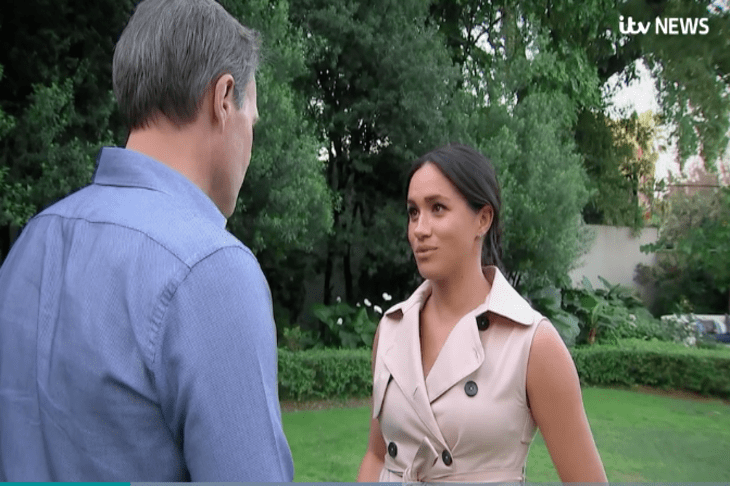So after Tom Bradby’s documentary on Harry and Meghan: An African Journey last night, what are people talking about?
The mines issue, 22 years after Diana walked through a minefield in Angola? Violence against women and girls in South Africa, as evident in the training that girls get to help them fend off attacks, which the couple saw in Cape Town? Conservation of elephants, Harry’s big thing? The couple – first together, then Harry singly – went to an astonishing succession of African states one after another – was it really necessary to pack them all into a single visit? – and visited a worthy project in each of them. They seemed friendly and accessible in dealing with people; they got a warm reception wherever they went, as you’d have expected.
Nope. The morning after the documentary, what’s actually leading the headlines is the personal, explosive stuff. A couple on the edge of losing it. Brothers more distant than before. Meghan saying about newspaper coverage:
“I never thought it would be easy but I thought it would be fair”.
A picture of a couple happy with each other, but profoundly unhappy with their lives and with press scrutiny. The documentary then has turned into being all about them. And you can’t blame Tom Bradby, an old friend of the prince’s. He did his job, raising all this stuff about their mental health. It wasn’t just sprung on the couple; it’ll likely have been discussed in advance. Harry could have directed him firmly back to the issues.
Take your pick as to which bit was the most damaging. What stuck with me was Meghan’s observation that “I tried to adopt the British sensibility of stiff upper lip…what that does internally is probably really damaging.”
It’s a generational voice, that; in a nutshell, the difference in sensibility between Harry and Meghan and the Queen. But for the Queen, it’s never been all about her.
And self-pity when you’re surrounded by privilege isn’t a good look. As one Twitter user, Peter Ogden, observed caustically: “Another magnificent piece of reputation management from whomever is advising Meghan “I’m existing not living” Markle, between private jet flights, New York “baby showers” and nice holidays in Elton John’s St Tropez villa.”
My own bet, incidentally, is that the advice didn’t come from the people that the couple actually pay to advise them, who include Fiona Mcilwham, former British ambassador to Albania.
What was evident in the documentary itself, what Tom Bradby observed, was that the trip was going really well until Harry and Meghan took legal action against British newspapers.
The coverage was really positive; the encounter between baby Archie and Archbishop Desmond Tutu was everywhere; there was respectful mention of the issues to go with the pictures. And then, those legal actions became the story; was it impossible for them to wait until they got home to let the lawyers loose?
And now, with the documentary, there’s more of the same. The focus is on the couple’s problems, their issues, their fragile mental health, their struggles with the press.
Let’s not rehearse the reasons why the near-universal adulation (didn’t share it myself) for Meghan a year and a half ago when they married turned into scepticism and then criticism, but it wasn’t wilful antagonism. She and Harry lost the love because of how they behaved. They almost won back the ground they lost with this trip and the good feeling surrounding the birth of baby Archie but they’ve remarkably turned benign coverage of their visit into shocked coverage of their state of mind. Is that really what they want?







Comments